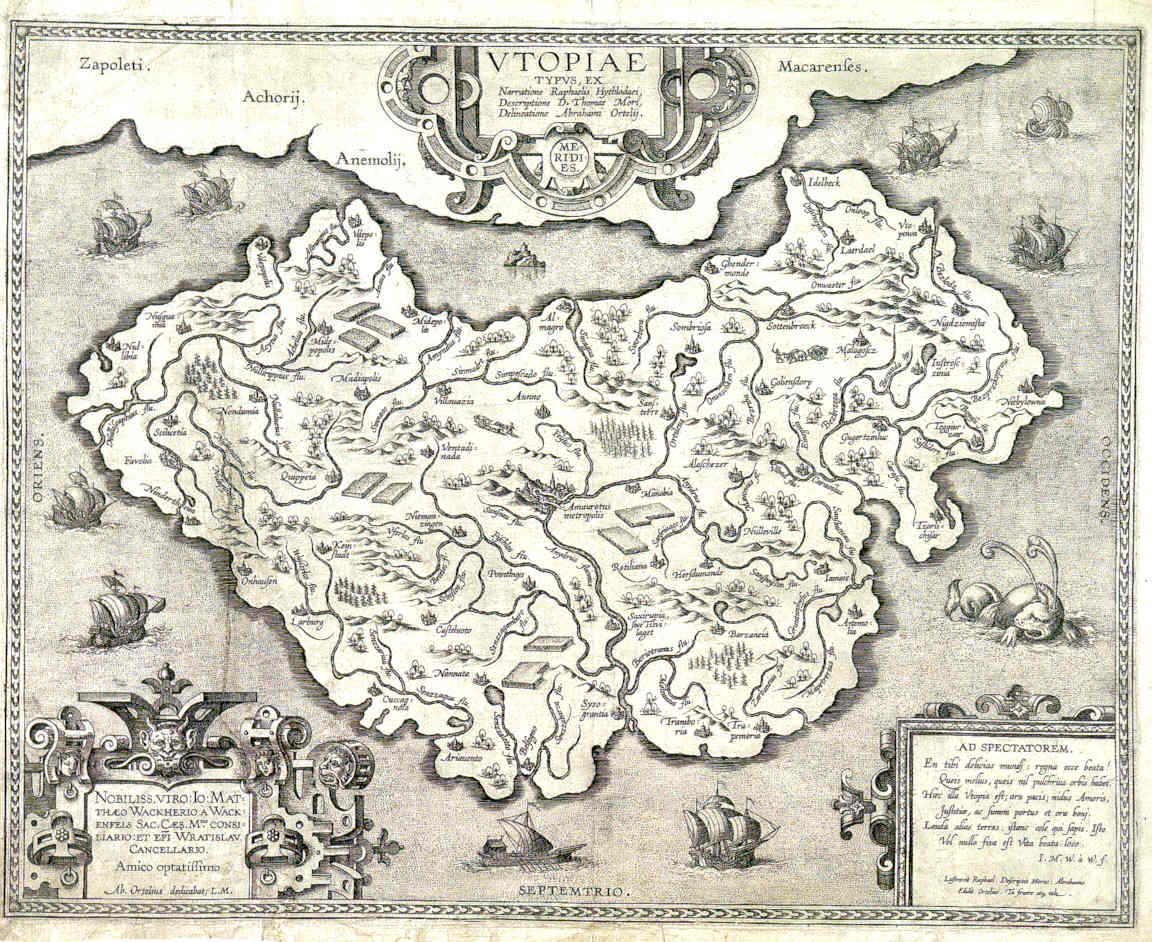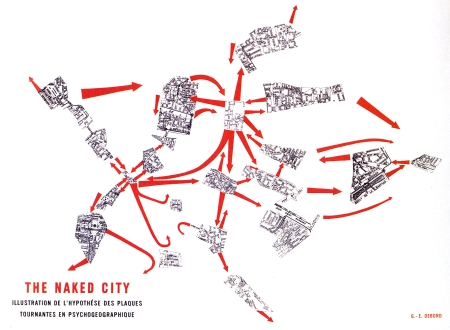- Lewis Mumford, “What is a city?” from The Culture of Cities.
A Cultural Studies Seminar at Columbia College Chicago
Week Two: Utopia(s)
- David Pinder, Visions of the City, chapters 1-4.
- Interview with David Pinder online via Bad Subjects.
Week Three: Situationist Critiques
- Ivan Chtcheglov, “Formulary for a New Urbanism”
- Guy Debord, “Introduction to a Critique of Urban Geography”
- David Pinder, Visions of the City, Chapter 5.
Week Four: Policing Space
- Don Mitchell, A Right to the City, chapters 1 & 2.
- Jonathan Sterne, The Politics of Muzak and Non-Aggressive Sound Deterrents.
- Chicago surveillance cameras
- Chicago surveillance featured on NPR
- Surveillance Camera Players
- Henry Giroux, "War on Terror: The Militarising of Public Space and Culture in the United States," Third Text, Vol. 18, Issue 4, 2004, 211–221.
- Stephen Graham, "Lessons in Urbicide," New Left Review 19, January-February 2003, pp. 63-77.
- Derek Gregory, "Palestine Under Siege," Antipode, Volume 36 Issue 4, 2004, Pages 601 - 606.
Week Five: Parks & Plazas
- Don Mitchell, A Right to the City, chapters 3-4.
- People's Park website
- Park(ing) Day
- San Franscisco's Parks: Public Space or Corporate Occupied Territory?
- The following links are from the Project for Public Spaces. I encourage you to check these out and take a look around their website for information and/or ideas:Top Public Squares in North America,The World's Best Squares ,Ten Principles for Creating Successful Public Squares.
Week Six: Space & Housing

- Don Mitchell, A Right to the City, chapters 5-7.
- Facts about homelessness from the National Coalition for the Homeless. Check out the first three documents (they are short).
- A documentary about housing in New Orleans called This is my Home. (MAKE SURE TO WATCH THIS)
- A New York Times video on housing in New Orleans.
- Documents about New Orleans housing demolitions. Check out the first document...the rest is for further research).
Week Seven: Gentrification, Part I

- Neil Smith, “Class Struggle on Avenue B: The Lower East Side as Wild Wild West,” in The New Urban Frontier: Gentrification and the Revanchist City.
- John J. Betancur, “The Politics of Gentrification.” Urban Affairs Review, 37: 780-814 (an article about West Town Chicago).
- CHICAGO-BASED GROUP PAPER DUE TODAY! (Click here for the assignment)
Recommended:
- Neil Smith, Chapter Two in The New Urban Frontier: Gentrification and the Revanchist City.
Week Eight: Gentrification, Part II

- Chicago Housing Authority, "Cabrini-Green Homes."
- Ramsin Canon, "The Most Complicated Simple Issue," Gapers Block, 2003.
- Deirdre Pfeiffer, "Displacement Through Discourse," Urban Anthropology, Spring 2006.
- Check out this culture jam of the Chicago Housing Authority's 'CHAnge' campaign, from 2005.
Week Ten: Grafitti & Street Art

- Bombing Modernism
- Lisa Prothers, “Culture Jamming with Pedro Carvajal,” Bad Subjects #37
- D.S. Black, "Fauxvertising, FSU-ism and other Semiotic Attacks on Consensual Reality."
- Emily Pohl-Weary, "Postering Public Space: Can DIY Poster Pirates Reclaim Your Downtown?"
- FINAL PAPER PROPOSAL DUE TODAY (SEE EMAIL FOR DETAILS)
Week Eleven: Urban Waste & Reclamation

- Jeff Ferrell, Empire of Scrounge (excerpts). Click HERE and HERE
- Joseph Sciorra, "Return to the Future: Puerto Rican Vernacular Architecture in New York City," in Re-Presenting the City, pp. 60-87. Also, here is a study guide for Sciorra, courtesy of Professor Ann Gunkel.
- Free Lunch Foragers
Week Thirteen: Automobility & Driving
- André Gorz, "The Social Ideology of the Motorcar."
- Cotten Seiler, "So That We As a Race Might Have Something Authentic to Travel By: African American Automobility and Cold-War Liberalism." American Quarterly, Volume 58, Number 4 (December 2006): 1091-1117
- Peter Norton, "Street Rivals: Jaywalking and the Invention of the Motor Age Street," Technology and Culture, Vol. 48, No. 2 (2007): 331-359.
Week Fourteen: Critical Mobility

- Michel DeCerteau "Walking in the City," from The Practice of Everyday Life. Here's a helpful synopsis/commentary on DeCerteau's 'Walking'.
- Iain Borden, "A Performative Critique of American Cities."
- Chris Carlsson, "Bicycling Over the Rainbow."
For further reading and research:
Week Fifteen: Mapping the Future?
- David Pinder on the need for Utopian Urbanism.
- Interview with Mike Davis, Part One & Part Two.
- On maps: "In Italy, Creating Worlds Takes Precision, Yes, and Politics."
- In-Class: Presentation of your psychogeographical maps!
- Michael Heffernan, "The Politics of the Map in the Early Twentieth Century," Cartography and Geographic Information Science, Vol. 29, No. 3, 2002, pp. 207-226.
- Cristina Grasseni, "Skilled landscapes: mapping practices of locality," Environment and Planning D: Society and Space, 2004, Vol. 22, pp. 699-717.
Week Sixteen: Presentations
- This is the last day of class! Our time will be reserved for final paper presentations.
- Your presentation will not be graded but it will count towards your overall participation grade. So make sure you prepare something that is informative, clear and concise (around five minutes). If you need me to reserve a TV or any other equipment for the day (i.e. a computer, projector and/or stereo) please let me know a week in advance so that I can make the proper arrangements.
- FINAL PAPERS ARE DUE TODAY!
Background for Your Pscyhogeographical Walks
Before you take part in a dérive with your group, you should make sure to read these articles:
An example of a situation-creating technique is the dérive. The dérive is the first step toward an urban praxis. It is a stroll through the city by several people who are out to understand the "psychogeographical articulation of the modern city." The strollers attempt an interpretive reading of the city, an architectural undcrstanding. They look at the city as a special instance of repressed desires. At the same time, they engage in "playful reconstructive behavior." Together they turn the city around. They see in the city unifying and empowering possibilities in place of the present framentation and pacification. This "turning around" or détournment is a key strategic concept of the Situationists. Détournment is a dialectical tool. It is an "insurrectionalstyle" by which a past form is used to show its own inherent untruth-- an untruth masked by ideology. It can be applied to billboards, to written texts, to films, to cartoons, etc., as well as to city spaces. Marx used it when he "turned Hegel on his head." He used the dialectic in the study of history to expose the ideological nature of Hegel's idealism. The Situationists use détoumement to demonstrate the scandalous poverty of everyday life despite the plenty of commodities. They attempted to demonstrate the contrast between what life presently is and what it could be. They wanted to rupture the spell of the ideology of our commodified consumer society so that our repressed desires of a more authentic nature could come forward. The situation is based on liberated desires rather than alienated ones. What these desires are cannot be stated a priori. They will emerge in the revolutionary process of situation-creation, of détournment . Presumably, communality, unification, and public urban space will emerge as more desirable than commodification, fragmentation, and privatization.
- Report on the Construction of Situations (particularly the last two sections)
- Theory of the Dérive
- Sadie Plant on Psychogeography and the Dérive
- Attempt at a Psychogeographical Description of Les Halles
- Preliminaries Toward Defining a Unitary Revolutionary Program
- Thomas F. McDonough, “Situationist Space,” October, Vol. 67, (Winter, 1994), pp. 58-77.
- Also, watch the film on the 'You Are Not Here' website.
Some inspiration for the assignment (from "Drifting with the Situationist International")...
Subscribe to:
Comments (Atom)





